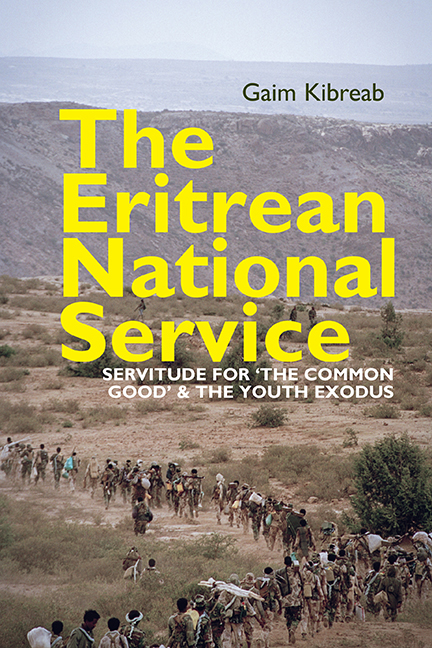Book contents
- Frontmatter
- Dedication
- Contents
- List of Figures and Tables
- Foreword
- Acknowledgements
- List of Acronyms & Abbreviations
- 1 Introduction
- 2 National/Military Service in Africa: Theories and Concepts
- 3 The Government and the Structure of the Eritrean Defence Force
- 4 The Nature of the Eritrean National Service and its Effectiveness as a Fighting Force
- 5 The Eritrean National Service as a Mechanism of Preserving and Transmitting the Core Values of the Liberation Struggle
- 6 The Eritrean National Service: A Vehicle for National Unity and Cohesion
- 7 The Eritrean National Service and Forced Equality
- 8 The Overarching Impact of the Eritrean National Service on the Social Fabric of Eritrean Society
- 9 Impact of the Open-Ended Eritrean National Service on Families and Conscripts
- 10 Conclusion
- Postscript: The UK Upper Tribunal (Immigration and Asylum Chamber) Country Guidance on Eritrea
- References
- Index
- Miscellaneous Endmatter
10 - Conclusion
Published online by Cambridge University Press: 11 August 2017
- Frontmatter
- Dedication
- Contents
- List of Figures and Tables
- Foreword
- Acknowledgements
- List of Acronyms & Abbreviations
- 1 Introduction
- 2 National/Military Service in Africa: Theories and Concepts
- 3 The Government and the Structure of the Eritrean Defence Force
- 4 The Nature of the Eritrean National Service and its Effectiveness as a Fighting Force
- 5 The Eritrean National Service as a Mechanism of Preserving and Transmitting the Core Values of the Liberation Struggle
- 6 The Eritrean National Service: A Vehicle for National Unity and Cohesion
- 7 The Eritrean National Service and Forced Equality
- 8 The Overarching Impact of the Eritrean National Service on the Social Fabric of Eritrean Society
- 9 Impact of the Open-Ended Eritrean National Service on Families and Conscripts
- 10 Conclusion
- Postscript: The UK Upper Tribunal (Immigration and Asylum Chamber) Country Guidance on Eritrea
- References
- Index
- Miscellaneous Endmatter
Summary
There is no easy walk to freedom anywhere, and many of us will have to pass through the valley of the shadow of death again and again before we reach the mountaintop of our desires.
Nelson Mandela (1953)THE BUILDING OF ERITREA's DEFENCE AND FIGHTING CAPABILITY
Theoretically, the decision of the postindependence Eritrean government to adopt and implement a universal and compulsory national service was legitimate and groundbreaking. There were a number of reasons for this. Firstly, for a small country with limited resources and small popula tion recovering from a devastating thirty years’ war (1961–1991), it was prudent to limit the size of the standing army and boost its defence and fighting capability through compulsory conscription, provided the duration of the latter is limited and strictly regulated by law. Secondly, the remarkable victory of the Eritrean People's Liberation Front (EPLF) over sub-Saharan Africa's largest army was chiefly due to the devotion of the volunteer combatants who served their country, not only without any remuneration, but also at the expense of their interests, including their lives. Although the realities of the two periods, namely the liberation struggle and the post-independence era, are fundamentally different, the government's attempt to build a defence capability based on the historical success of the liberation struggle is an innovative idea. Justifiably, one of the central aims of the Eritrean National Service (ENS) is to establish a strong defence force by drawing on the experiences gained during the liberation struggle. All things being equal, the approach might have provided an opportunity for safeguarding the sovereignty and territorial integrity of the country cost-effectively.
Nevertheless, in spite of this initially worthy endeavour (which later went woefully wrong, partly due to the fact that, rhetoric notwith standing, the ruler of the country, Isias Afwerki, is not committed to the development of an autonomous, professional and institutionalised military), the findings of the study based on the perceptions of the conscripts interviewed show that the national service has failed to build Eritrea's defence and fighting capability.
Information
- Type
- Chapter
- Information
- The Eritrean National ServiceServitude for 'the common good' and the Youth Exodus, pp. 177 - 190Publisher: Boydell & BrewerPrint publication year: 2017
